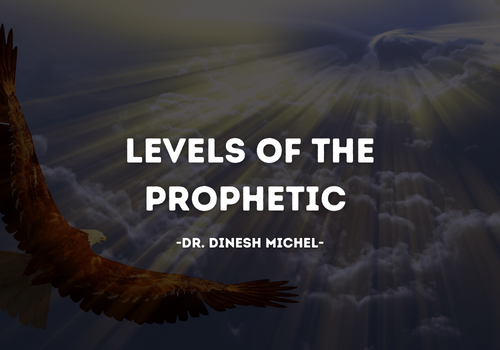The concept of prophecy is a significant theme in the Bible, and understanding the different levels of prophecy can help believers grasp the various ways in which God communicates with His people. In 1 Corinthians 14, the apostle Paul encourages all believers to desire the gift of prophecy. However, it is important to recognize that while everyone can prophesy, not everyone is called to be a prophet. Let’s explore the three levels of prophecy mentioned in the Bible.
The first level of prophecy is known as the “Spirit of Prophecy.” At this level, individuals prophesy when they are in an atmosphere of the prophetic or come under the anointing of the Holy Spirit. These individuals may not regularly prophesy, but when they find themselves in a prophetic environment, they become sensitive to the leading of the Spirit and can speak prophetically. King Saul in the Old Testament is a prime example of someone who prophesied among the prophets but was not a prophet himself. (1 Samuel 10:10-12).
Moving on to the second level, we encounter the “Gift of Prophecy.” This level involves individuals who possess the prophetic gift and regularly operate in it. Unlike those at the first level, these individuals are not confined to a specific atmosphere or gathering to prophesy. The gift of prophecy is mentioned in 1 Corinthians 12, where Paul emphasizes that not all who prophesy are prophets. This level of prophecy is a valuable gift given to believers by the Holy Spirit, enabling them to speak forth God’s messages to edify, encourage, and comfort others. (1 Corinthians 12:7-11)
Lastly, we come to the third level, which is the “Office of the Prophet.” Unlike the gift of prophecy, the office of the prophet is a calling rather than just a gift. While any believer can operate in the gift of prophecy, the office of the prophet is a lifelong calling appointed by God. Those called to this office have a unique anointing and authority to function as prophets. Ephesians 4:11 mentions the office of prophet as one of the five-fold ministry gifts that Christ has given to His church. Prophets play a foundational role in church government and provide guidance, revelation, and direction to the body of Christ.
Differentiating between the gift and the office of the prophet can be seen in Acts 21:9-10. In these verses, it is mentioned that Philip had four unmarried daughters who prophesied, but during their stay, a prophet named Agabus arrived from Judea. This distinction highlights that while the daughters possessed the gift of prophecy, Agabus operated in the office of the prophet.
Understanding these three levels of prophecy is crucial as it helps us grasp the prophetic better and comprehend the roles and functions within the body of Christ. Each level serves a unique purpose in building up and equipping the church. By desiring the gift of prophecy and seeking the guidance of the Holy Spirit, believers can operate in their respective levels and contribute to the edification and growth of the body of Christ.

